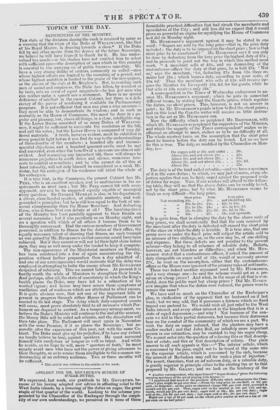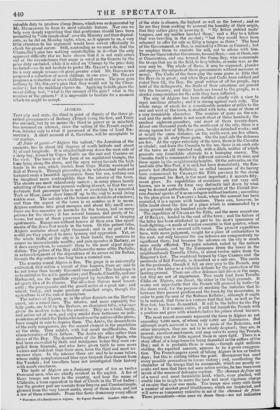APOLOGY FOR MR. GOULBURN'S SCHEME OF SUGAR-DUTIES.
WE expressed, last week, our gratitude to Mr. GOULBURN, be- cause of his having adopted our advice in affording relief to the West India islands, by a lowering of the duties on sugar, the great staple of that quarter of the world. Looking to the scheme pro- pounded by the Chancellor of the Exchequer through the simpli- city of our own understandings, we perceived in it none of those formidable practical difficulties that had struck the merchants and speculators of the City ; and still less did we expect that it would prove so powerful an engine for mystifying the House of Commons as it did on Monday night. Mr. HusxissoN's argument against it may be stated in one word : " Sugars are sold by the long price-that is, the price duty included ; the duty is to be imposecron the short price ; how is that short price to be ascertained ? " Mr. HUSKISSON says it can only be done by deducting from the long price the highest duty of 27s.; and he proceeds to point out the way in which this method must work. " A merchant sells at 52s., and on demanding of the customhouse-officer the duty at that price, he is told 27s. ` Not so,' says the merchant, for, deducting 27s. from 52s. there re- mains but 25s. ; which bears a duty, according to your scale, of 25s. 6d.' Thus the merchant who sells at 52s. will receive (ar- gues the Member for Liverpool) 26s. 6d. for his goods, while he that sells at 53s. receives only 26s." A correspondent in the Times of Wednesday endeavours to an- swer Mr. HUSKISSON'S argument; which he puts in somewhat different terms, by stating that the Gazette prices, which regulate the duties, are short prices. This, however, is not an answer in point ; for Mr. HUSKISSON'S puzzle is how to find the short prices ; and on this head the Gazette writer will receive as little instruc- tion in the art as Mr. HusxissoN can.
Now the difficulty which SO perplexed Mr. BROUGHAM, with which Mr. Husxissom so perplexed the supporters of the Minister, and which the sagacity of the Times correspondent* makes so in- effectual an attempt to meet, strikes us to be no difficulty at all. The whole mystery turns on the assumption that the short price must be known before the duty can be levied. Let us see how far this is true. The duty, as modified by the Chancellor on Mon- day, is- On sugars sold at 20s. and under . . 20s.
Above 20s. and not above 21s. . . . 22s.
Above 21s. and not above 23s.. . 24s.
Above 23s. and not above 26s.. . 25s. 6ci.
Above 26s. 27s.
The duty is of the kind called rateable,-and we have a specimen of it in the corn-duties ; to which, we may just observe, every ob- jection applies that can be fairly urged against the proposed scale of duties for Sugar. Now, if our readers will attend to the follow- ing table, they will see that the above duties can be readily levied, not by the short price, but by what Mr. HUSKISSON seems to think so very difficult-the long price.
Short price. Duty. Long price.
Not exceeding 20:. . . . 20s. . not exceeding 42s. 20s. to 21s. 22s. . 42s. to 45s. e! Py PP „ 21s. to 23s. 24s. . 45s. to 48s. a /I „ 23s. to 20s. 25s. a 48s. 641 to 53s. 26s. . . 278. . 53s. and upwards.
i It s quite true, that in charging the duty by the above scale of long prices, we shall occasionally find that the sum received by the merchant after the duty is deducted will exceed the short price of the class on which the duty is leviable. It is true also, that one penny over or under the fixed price will subject the article sold to an increase of two shillings, or, as the case may be, of one shilling and sixpence. But these defects are not peculiar to the present scheme-they belong to all schemes of rateable duty. Defects, however, are not blunders or difficulties ; and when Mr. Hus- xissoN stated that a customhouse-officer, if asked the amount of duty chargeable on sugar sold at 52s. would of necessity answer 27s., he went on the assumption. either that the customhouse- officer or the House were ignorant of the primary rules of arithmetic. There was indeed another argument used by Mr. HUSKISSON, and a very strange one-he said the scheme would act as a pre- mium on cheap prices !. And what, in the name of all that is won- derful, does the public want but cheap prices ? Did Mr. Hums SON imagine that when the duties were reduced, the prices were to remain the same ?
We have said so much on the Chancellor of the Exchequer's plan, in vindication of the approval that we bestowed on it last week ; but we may add, that it possesses a fairness which no fixed impost can pretend to. We would wish all just relief to the West India interest, and every other interest in the kingdom that is in a state of equal depression ;-and why ? Not because of the con- cern we feel in their partial distresses, but because their distresses bear on the comfort of the community of which we are a part. We wish the duty on sugar reduced, that the planters may have a readier market ; and that John Bull, an infinitely more important person in our estimation, may be enabled to buy his sugar cheap. We cannot enter into the question of relieving this or that descrip- tion of estate, and this or that description of colony. Our plain answer to all such appeals is this :-" The inferior article, which is consumed by the poor, ought not to be taxed at the same rate as the superior article, which is consumed by the rich, because the interest of Barbadoes may call for such a plan of injustice." We assert, therefore, that an ad valorem duty, or a rateable duty, is greatly superior in principle either to the existing tax or to that proposed by Mr. GRANT; and we look on the tendency 6f the * Another correspondent, who signs himself "Sugar-Broker," gives thefollowing amusing specimen of the art of playing with figures :- " I apprehend that much of the practical difficulty which embarrasses the Chan- cellor's plan might be got over thus :-From the long price let one-half, or 501. per cent., be deducted ; on the price so obtained charge 100/. per cent, duty, provided it exceed not 27s. per cwt. Thus, sugar sold in the market at 54s. per cwt. and up- wards, would pay 27s. per cwt duty; sugar sold at 50s., 25s. per cwt. duty; sugar sold at 45s., 22s. fid. per cwt. duty ; and sugar sold at 40s., 20s. per cwt. duty."
Might not a tax 01 50 per cent, on the whole price answer as well as a tax of 100 per cent, on the half price rateable duty to produce cheap Prices, which was so deprecated by Mr. Husxissoar, to form its most valuable feature. Nor can we help very deeply regretting that that gentleman should have been permitted to "ride rough-shod" over the Ministry and their depend- ents, as he did on Monday night, when, as it appears to us, a very little attention to his argument would have served effectually to • check his proud career. Still, contending as we must do, that the Chancellor's plan has nothing unintelligible in it—that the only apparent difficulty (for we have shown that it is not real) arises out of the circumstance that sugar is rated in the Gazette by the price duty excluded, while it is rated on 'Change by the price duty included—we do not hesitate to prefer Mr. GRANT'S scheme ; and for a very simple reason—it gives greater relief. Mr. GOULBURN proposed a reduction of seven shillings in one case ; Mr. GRANT proposes a reduction of seven shillings in all cases. . The poor gain nothing by Mr. GRANT'S plan that they would not by the Chan- cellor's; but the middling classes do. Applying to both plans the never-failing test, "what is the amount of the gain ? what is the number of the gainers ?" it is impossible to hesitate for a moment which we ought to accept.



























 Previous page
Previous page